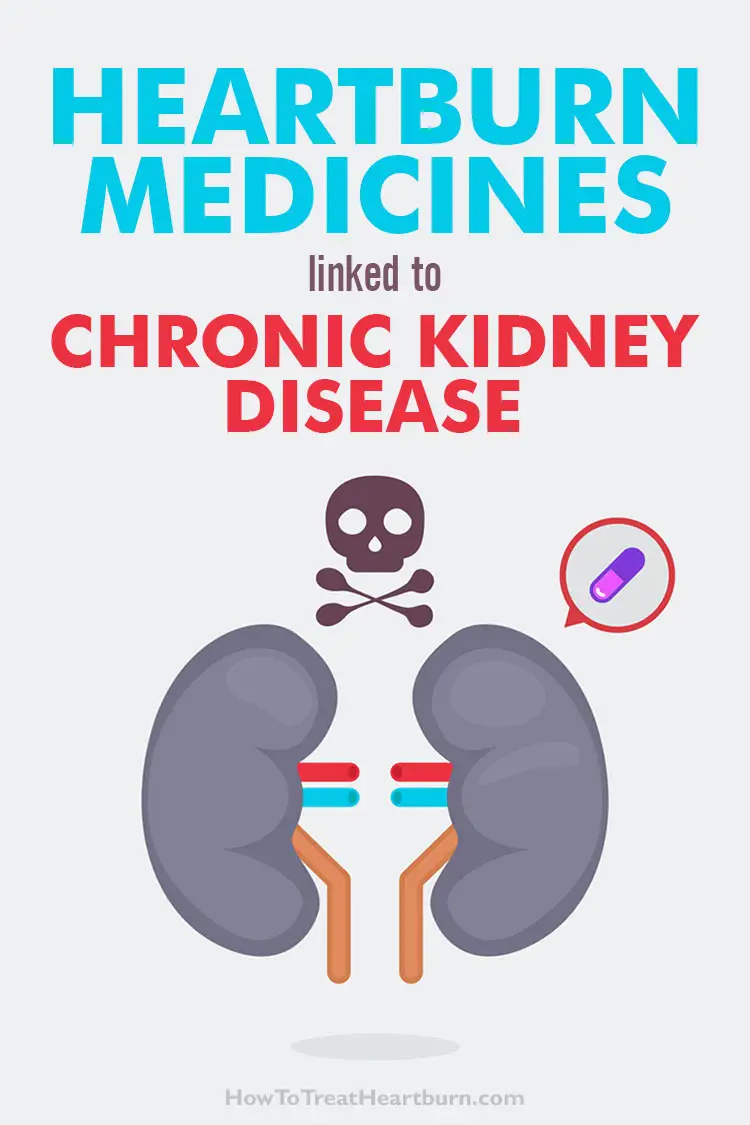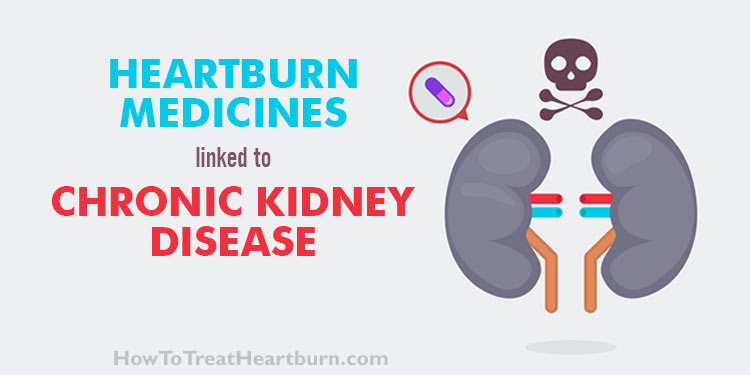Disclosure: I am compensated for purchases made through some links on this site. Click for details.
Chronic kidney disease (CKD) also known as chronic renal failure (CRF) or chronic renal disease (CRD) is on the rise with over 26 million American sufferers.1 That means over 8% of the United States population suffers from chronic kidney disease.
Research studies now point to a certain class of heartburn medications as a contributing factor to chronic kidney disease. These heartburn medications are proton pump inhibitors (PPIs) one of the most widely prescribed medications for the treatment of GERD and other gastrointestinal disorders.
What is Chronic Kidney Disease?
Chronic kidney disease includes conditions that damage kidneys and decrease their ability to properly filter blood. Lack of proper filtration by the kidneys causes wastes to build up in the blood.
Chronic kidney disease can lead to cardiovascular disease, high blood pressure, anemia, nutritional deficiencies, brittle bones, and nerve damage.2 Heart disease is the leading cause of death for those suffering from chronic kidney disease.
Two main risk factors for chronic kidney disease are diabetes and high blood pressure and now it seems that PPIs are a risk factor as well.
Many in the early stages of chronic kidney disease do not notice symptoms of the damage. If you are at risk, testing is important. Early detection and treatment can prevent the progression of chronic kidney disease.
The final stage of chronic kidney disease is kidney failure. The Unites States has over 100,000 diagnosed cases of kidney failure each year.3 Those in kidney failure must undergo dialysis or kidney transplant.
Additional Facts:
- The risk of acquiring chronic kidney disease increase with age.
- There is a greater risk of developing chronic kidney disease if there is a family history of kidney failure.
- Certain races are at greater risk of acquiring chronic kidney disease. In the United States, African Americans, Hispanic Americans, Asians, Pacific Islanders, and American Indians are at greater risk.
What are Proton pump inhibitors (PPIs)?
Proton pump inhibitors (PPIs) are a class of heartburn drugs used to reduce stomach acid production. They are available in both prescription and over-the-counter (OTC) versions.
PPIs are used to prevent acid irritation of the esophagus, stomach, and duodenum (first part of the intestines) so they might heal from erosive damage.
The reduction in stomach acid does help reduce heartburn, however, the primary use of PPIs is not for controlling heartburn but to promote healing of damaged upper gastrointestinal (GI) linings.
PPIs are the strongest available acid blockers but are not for immediate relief of heartburn. It takes days for PPIs to provide relief from acid irritation. Healing time and relief will vary depending on the problem for which the drug is prescribed. If treating an ulcer or severe erosion, relief will take longer.
PPIs include:
- AcipHex
- Dexilant
- Kapidex
- Losec
- Nexium
- Prevacid
- Prilosec
- Protonix
- Rapinex
- Vimovo
- Zegerid
PPIs Cause Kidney Injury and Kidney Disease
Although PPIs provide a benefit for many. Studies link PPIs to increased risk of chronic kidney disease.4,5
Previous studies Studies:
Previous PPI studies have shown an increase in the number of acute kidney injury and inflammatory kidney (acute interstitial nephritis/AIN). Though many of these patients recover, some develop chronic kidney disease.
Benjamin Lazarus Study:
Benjamin Lazarus at Johns Hopkins University in Baltimore, MD and his colleagues followed 10,482 adults with normal kidney function from 1996 to 2011.
Lazarus found that patients using PPIs were at 20% to 50% greater risk of developing chronic kidney disease.
The study was replicated following over 240,000 patients from 1997 to 2014.
In this version of the study, patients took H2 blockers, a different class of stomach acid suppressor. No greater risk of developing kidney disease was shown with H2 blockers as opposed to PPIs.6
Pradeep Arora Study:
Pradeep Arora at the State University of New York’s School of Medicine and Biomedical Science in Buffalo and his team discovered 24,149 out of 71,516 patients between 2001-2008 developed chronic kidney disease. Of these patients, 25.7% had been treated with PPIs. The study went further to show that patients who had taken PPIs had a 10% greater risk of developing chronic kidney disease and a 76% greater risk of early death. Though they were less likely to have vascular disease, cancer, diabetes, hypertension and chronic obstructive pulmonary disease (COPD).5,7
Symptoms of Chronic Kidney Disease
Symptoms of chronic kidney disease are not often noticed until more advanced stages of the disease. Some common symptoms are:
- tiredness
- concentration issues
- nausea
- vomiting
- hiccups
- poor appetite
- sleep issues
- muscle cramps
- swelling of feet and ankles
- puffy eyes
- itchiness
- frequent urination
- chest pain
- shortness of breath
- high blood pressure
How to Test For Chronic Kidney Disease
Early detection can slow or stop the progression of kidney disease. To diagnose your condition and check kidney function, your doctor may do the following:
- Measure kidney function by calculating your glomerular filtration rate (GFR). It is calculated by analyzing blood creatinine, age, race, and gender. The GFR helps determine the stage of kidney disease.
- A computerized tomography (CT) scan or ultrasound to provide a visual for determining the condition of your kidneys and urinary tract.
- A kidney biopsy to test for certain types of disease and the extent of kidney damage.
Treatment for Chronic Kidney Disease
The test results from the glomerular filtration rate, CT, and kidney biopsy will help your doctor determine a method of treatment if any is available.
Treating the Cause of Chronic Kidney Disease
Treatment plans are designed to control the cause of kidney disease and slow its progression. Treatments will vary as causes will vary. Though a treatment plan may be in effect, kidney health can continue to decline even if the underlining condition is controlled.
Treating Chronic Kidney Disease Complications
Complications from kidney disease can be controlled to some extent. Treatment may consist of:
- High blood pressure medications
- Cholesterol medication
- Anemia medication
- Treat any diabetic conditions
- Medication to lower retain fluids
- Medication to improve bone condition
- An healthier low protein diet
- Reduce sodium intake
- Getting off PPI medication
Treatment Kidney Failure
Kidney failure is the final stage of chronic kidney disease. In kidney failure, dialysis or a kidney transplant is required.
Avoiding Kidney Damage from PPIs
PPIs can be helpful in recovery from GERD, ulcers, or other severe upper GI conditions, but long-term use of PPIs for heartburn, acid reflux, and GERD is harmful.
Many heartburn sufferers take PPIs for months or even years without understanding the side effects.
In the United States, OTC versions of PPIs clearly state that they are not to be taken for longer than 14 days or rounds of the drug more often than every 4 months.
Too many heartburn sufferers take PPIs without being properly educated on their use and side effects.
This lack of education is partly due to a lack of self-education on the part of the patient and partially from a lack of instruction from care providers.
The fact that many PPIs are available in over-the-counter form may also lure patients into a false sense of security in the safety of the drug.
PPIs should not be taken to control heartburn. If you are taking PPIs for this purpose, it may be wise to wean off them to avoid kidney damage. Stopping long-term use without weaning off PPIs is not advisable.

References
1) “About Chronic Kidney Disease.” National Kidney Foundation (NKF), February 15, 2017.
2) “Chronic kidney disease.” MedlinePlus, (n.d.).
3) “About Kidney Disease.” National Kidney Foundation of Arizona, (n.d.).
4) Brewster UC, & Perazella MA. “Proton pump inhibitors and the kidney: critical review.” National Center for Biotechnology Information, U.S. National Library of Medicine, Clinical Nephrology, August 2007.
5) Dennis Thompson. “Chronic Heartburn Drugs Tied to Higher Risk of Kidney Disease.” HealthDay, October 27, 2015.
6) Lazarus B, Chen Y, Wilson FP, Sang Y, Chang AR, Coresh J, & Grams ME. “Proton Pump Inhibitor Use and the Risk of Chronic Kidney Disease.” National Center for Biotechnology Information, U.S. National Library of Medicine, JAMA Internal Medicine, February 2016.
7) Pradeep AroraEmail, Anu Gupta, Mojgan Golzy, Nilang Patel, Randolph L. Carter, Kabir Jalal, & James W. Lohr. “Proton pump inhibitors are associated with increased risk of development of chronic kidney disease.” BMC Nephrology, August 3, 2016.



